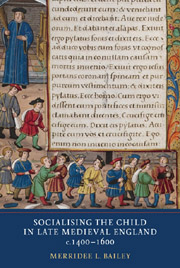Book contents
- Frontmatter
- Contents
- Acknowledgements
- Abbreviations
- Transcription conventions
- Introduction
- 1 Courtesy Poems
- 2 Readers
- 3 Virtue and Vice
- 4 Sixteenth-Century Books
- 5 The School
- Conclusion
- Appendix A Appendix A: English Vernacular Courtesy Poems
- Appendix B Incunabula
- Appendix C Sixteenth-Century Books
- Appendix D Educational Sources
- Bibliography
- Index
- YORK MEDIEVAL PRESS: PUBLICATIONS
Introduction
Published online by Cambridge University Press: 05 April 2013
- Frontmatter
- Contents
- Acknowledgements
- Abbreviations
- Transcription conventions
- Introduction
- 1 Courtesy Poems
- 2 Readers
- 3 Virtue and Vice
- 4 Sixteenth-Century Books
- 5 The School
- Conclusion
- Appendix A Appendix A: English Vernacular Courtesy Poems
- Appendix B Incunabula
- Appendix C Sixteenth-Century Books
- Appendix D Educational Sources
- Bibliography
- Index
- YORK MEDIEVAL PRESS: PUBLICATIONS
Summary
‘Nature is an effectual thynge, but educacion more effectual.’
This book addresses the socialising roles of the late medieval household and the school. It asks how childhood was imagined by medieval writers and educators and then presented to contemporary child and adult readers. Although several studies have examined medieval childhood, there has been no systematic attempt to place the socialisation of children in late medieval and early modern England into the broader context of society, politics and religion. Childhood represents more than a chronological age or physical form; it is a time of instruction and learning, when relationships and abilities are developed and identity is created. As Erasmus advised, nature is effectual, but ‘educacion more effectual’. This book investigates the manner in which late medieval English society looked to children as the standard bearers of good conduct and behaviour, charging socialisation with broader social and political meaning. Each chapter analyses a particular genre of literature that conveys a sense of childhood and children. In doing so, it addresses both chronological as well as thematic shifts in the socialising process, building a picture of childhood over 200 years from the end of medieval England to the early modern period.
- Type
- Chapter
- Information
- Publisher: Boydell & BrewerPrint publication year: 2012



